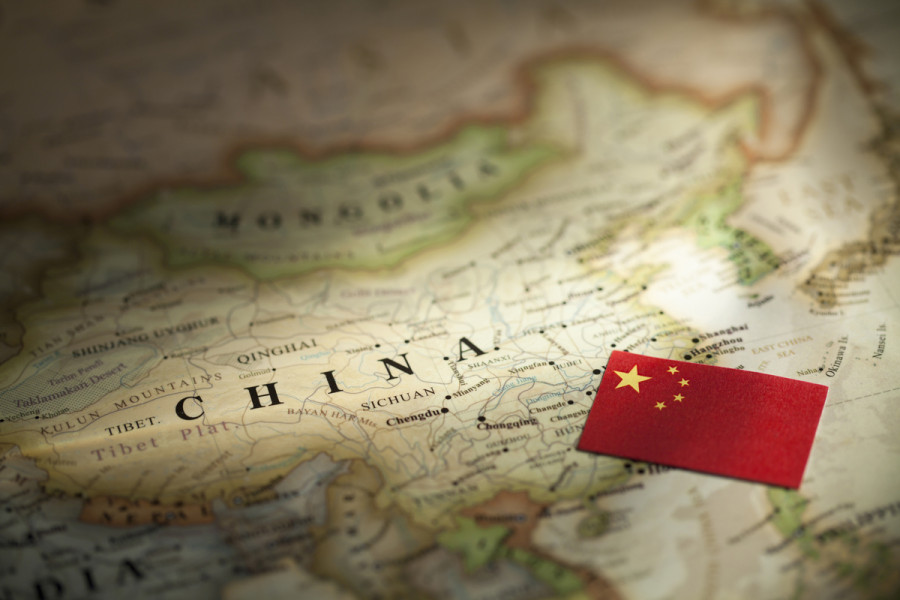Columns
The dragon atop the world
Chinese interests lie in the Indian Ocean region, not exclusively on the Himalayan front.
Lok Raj Baral
China is once again in the limelight, but for the wrong reasons. United States President Donald Trump has blamed China for not informing the world in time about the spread of the coronavirus that has already killed more than 100,000 people in the US alone. Other countries are also great sufferers, and the end of the pandemic is still not in sight. Yet to apportion all blame to China is neither justifiable nor plausible as all countries were mostly caught unawares or the political leaders didn’t take it seriously at the initial stages of the outbreak. President Trump’s criticism of the World Health Organisation (WHO) for its alleged pro-China stance for trying to tackle the dreadful disease is also unfair if analysed from different angles. China has shown its ‘indignant denial’ while the WHO has refused to accept Trump's charges against it with modesty.
China has attracted the attention of the world for other reasons too: The ancient civilisational state is guided by its own traditional ethos, pride and ups and downs, its rise as a potential world power, spectacular economic development, military might, the actual and psychological influence it has been able to demonstrate, and its aspirations to be the first world power and accompanying strategies. China’s one-party rule and the stability it has provided since the inauguration of the People’s Republic of China in 1949 has not shown any immediate prospect of internal upheaval and systemic collapse as happened to the then Soviet Union. A sense of civilisational identity, not a sense of 'nationhood', has helped the country to maintain unity and solidarity.
Civilisational state
China’s long history and the processes of acculturation and absorption of other identities has made it a 'civilisational state' until quite recently in modern Chinese history. And China’s present world view and the behaviour it displays in its relations with other countries are also reflections of the past as well as of its aspirations for achieving the status of a super power or what is called 'hyperpower'. Its expanse of territory supported by a more or less solidified social structure and political homogeneity has helped the country develop within a short span of time. It has now been able to project itself as a potential superpower that has already posed a challenge to the only superpower, the United States of America.
China's spectacular rise as an economic power next to the US and the psychological environment it has been able to create has made America jittery. There is an impression that the US has started abdicating its leadership role across the world, and Trump’s big bang approach to both domestic and foreign policies has not enhanced the image of the country. Adding to Trump’s plight is his handling of the coronavirus crisis and failure in leadership. More than three million Americans are now jobless with a rapidly dwindling economy. Instead of keeping his house in order, Trump has heaped his ire on China for letting the floodgates of the disease open.
Can China displace the United States in the near future? Territorially, militarily, demographically and economically, China can match the United States, given that the present economic development remains steady. However, such features alone cannot make a country a superpower if many other criteria, such as ideological appeal, linguistic dominance, scope for alternative views and opinions, popular legitimacy of power and other human values, are absent. Nevertheless, no power can remain at its zenith permanently. By nature also, decline is inevitable. The British Empire where the sun never set in the 19th and early 20th centuries can no longer influence the world.
In contrast, American power is likely to continue to influence the world notwithstanding the limits to its rise. The United States may remain as a status quo power that China is unlikely to displace in the foreseeable future because China is still far behind it in many respects as stated before. Yet, China has been able to reach out to various continents giving the impression that it is going to be the foremost world power on a par with America.
What problems does China confront for becoming an indomitable world power? First, all countries that see China as a threat to their status, if not existence, are liberal democracies opposed to Chinese political ideology and one-party rule. The Indo-Pacific strategy forged by the US includes India, Australia and Japan. Its principal objective is to limit Chinese activities in the Indian Ocean and Pacific regions where Chinese trade and supply lines are regulated. Since China has a relatively small coastline despite its huge landmass, it has to use the Indian Ocean where other adversarial powers are present to limit its manoeuvrability.
Second, China-India relations are not too friendly giving occasional rise to border skirmishes and misunderstanding. Moreover, both are rival powers despite a much advanced Chinese economy with a global presence. Yet, India as a liberal democracy and competitive power to China draws the attention of other Western and Asia-Pacific powers. The present Indian position as a power is enhanced due to its economic growth, nuclear status, technological know-how and military strength. Indian democracy is an ideal example for others as its unbroken democratic tradition has been able to hold India together.
Indian Ocean region
Finally, coming closer to Nepal’s neighbourhood, Chinese vital interests lie in the Indian Ocean region, not exclusively on the Himalayan front. Countries that share their borders with China are important for getting further footholds in the areas south of the Himalaya. But they are not as significant as the Indian Ocean areas for realising Chinese vital interests. Thus, another Sino-Indian war in the Himalaya is highly unlikely despite occasional local-level standoffs between the two armies.
Sandwiched between the two rising Asian powers, it is imperative for Nepal to take advantage of the existing security environment by making the country prosperous and humane with a tour de force required to gain the trust and cooperation of both neighbours.




 16.12°C Kathmandu
16.12°C Kathmandu















